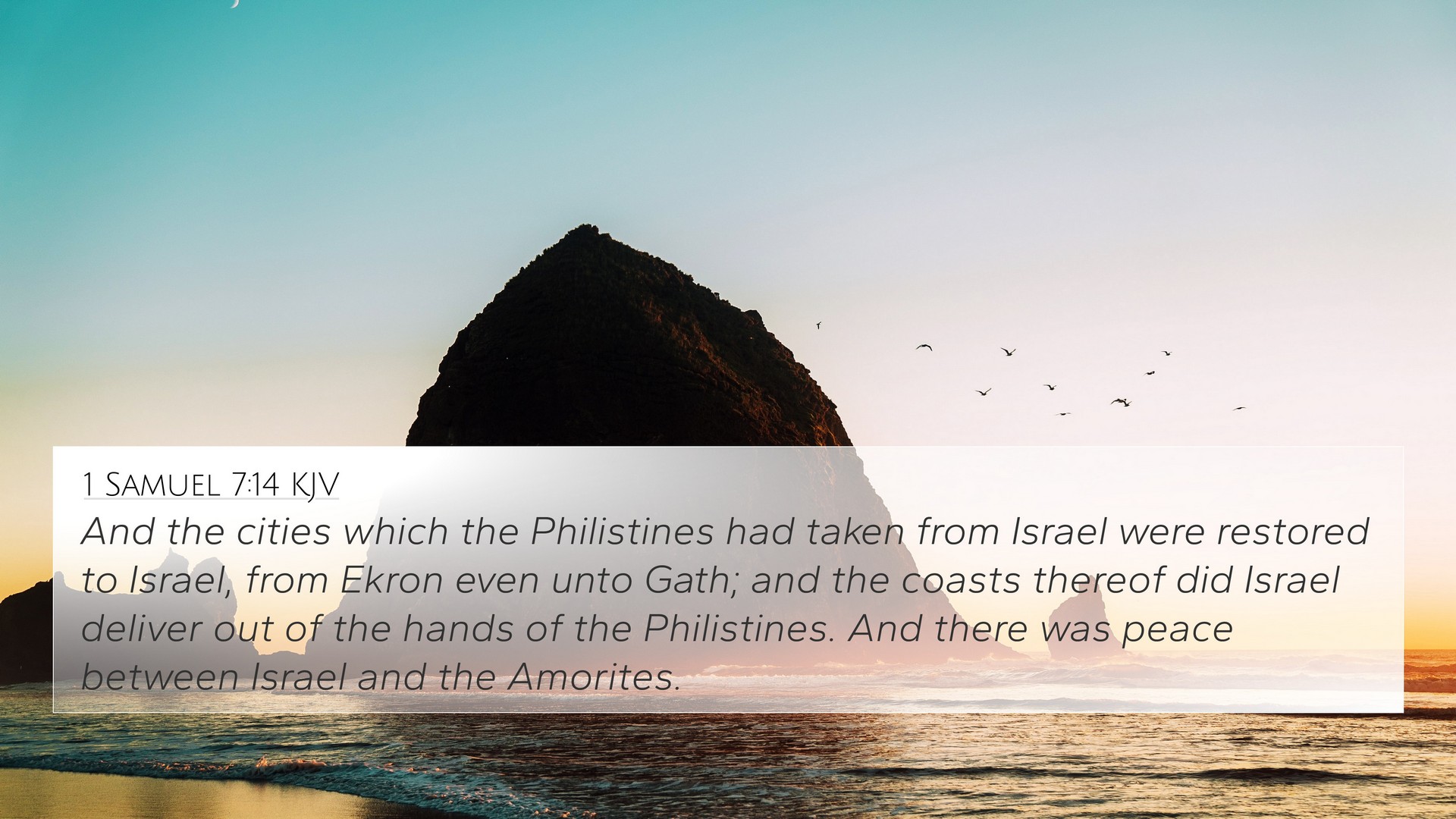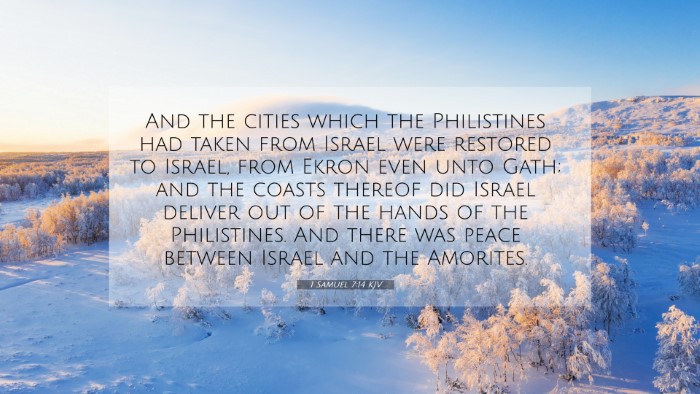Understanding 1 Samuel 7:14
This passage from 1 Samuel 7:14 holds significant meaning within the broader narrative of Israel's history and their relationship with God. The verse reads: “And the cities which the Philistines had taken from Israel were restored to Israel, from Ekron even unto Gath; and the borders thereof did Israel deliver out of the hands of the Philistines. And there was peace between Israel and the Amorites.”
Contextual Background
To fully appreciate the meaning of this verse, it is essential to explore its context:
- Israel's Struggles: Prior to this victory, the Israelites had faced numerous challenges and conflicts with the Philistines.
- The Role of Samuel: Samuel served not only as a prophet but as a judge who leads the people back to God, emphasizing repentance and divine favor.
- Divine Intervention: The restoration of cities signifies God's providence in delivering Israel from their enemies and establishing peace.
Commentary Insights
Here are key insights from respected public domain commentators on this verse:
- Matthew Henry: His commentary emphasizes the importance of divine assistance in battles. Henry states that the restoration of the cities marks not merely physical recovery but a spiritual renewal where the nation turns back to God with heartfelt repentance.
- Albert Barnes: Barnes highlights the geopolitical implications of this restoration, explaining how it symbolizes God’s covenant faithfulness and His desire for His people to reclaim their heritage. He also points out that peace with the Amorites indicates a broader stability that Israel experiences after turning back to God.
- Adam Clarke: Clarke provides a descriptive analysis of the cities mentioned, illustrating their historical and cultural significance. He notes that the geographical restoration reflects God's blessing on Israel's obedience, allowing them to live in peace.
Thematic Connections
This verse resonates with several themes in the Bible:
- Restoration: Many verses speak about the theme of restoration and redemption (e.g., Joel 2:25).
- Divine Favors: The idea of God favoring His people in times of distress can also be found in Psalms 46:1.
- Peace: The importance of peace among nations is a recurring biblical theme (e.g., Isaiah 2:4).
Cross-References
1 Samuel 7:14 has several cross-references that can deepen its understanding:
- Judges 10:16 - The Israelites' cry to God in times of crisis.
- 1 Samuel 4:22 - The despair experienced by Israel before this victory.
- 1 Samuel 6:9 - God’s intervention upon the return of the Ark.
- 2 Samuel 8:1 - David’s campaigns against the Philistines.
- Isaiah 11:13 - The promise of restoration and peace among tribes.
- Leviticus 26:6 - God's assurance of peace and security when His people obey Him.
- 2 Chronicles 20:30 - God granting peace to Judah during Jehoshaphat's reign.
Practical Application
For believers today, 1 Samuel 7:14 teaches about the importance of aligning one's life with God’s purpose. It encourages:
- Seeking God's Help: Just as the Israelites turned back to Him, we too are called to seek divine intervention in our lives.
- Embracing Restoration: Understanding that God desires to restore us, both spiritually and physically when we turn to Him.
- Pursuing Peace: Striving for peace in our relationships and communities, reflecting God’s love and grace.
Further Study on Cross-Referencing
To explore the thematic connections and cross-references further, consider using these tools:
- Bible Concordance: A valuable tool for finding specific verses related to a theme or word.
- Bible Cross-Reference Guide: A structured approach to understanding how different Scriptures relate.
- Cross-Reference Bible Study: Engage in methodical studies by comparing parallel verses.
Conclusion
In conclusion, 1 Samuel 7:14 encapsulates a profound narrative of restoration and divine aid. By exploring the themes of this verse and its connections within the biblical text, believers are encouraged to reflect on their relationship with God, seek His guidance, and ultimately enjoy the peace that comes from obedience and faithfulness.






